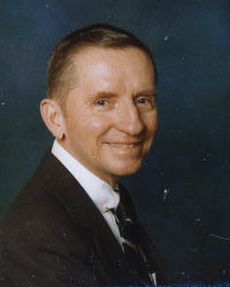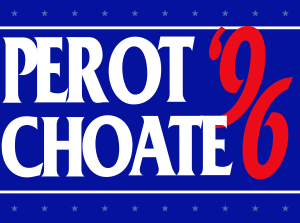Ross Perot facts for kids
Quick facts for kids
Ross Perot
|
|
|---|---|
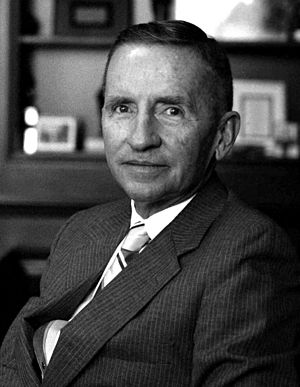
Portrait by Allan Warren, 1986
|
|
| Born |
Henry Ross Perot
June 27, 1930 Texarkana, Texas, U.S.
|
| Died | July 9, 2019 (aged 89) |
| Resting place | Sparkman-Hillcrest Memorial Park Cemetery, Dallas |
| Education |
|
| Political party |
|
| Spouse(s) |
Margot Birmingham
(m. 1956) |
| Children | 5, including Ross Jr. |
| Military career | |
| Service/ |
United States Navy |
| Years of service | 1953–1957 |
| Rank | Lieutenant |
| Signature | |
Henry Ross Perot Sr. (born June 27, 1930 – died July 9, 2019) was an American businessman, politician, and helper of others. He started two big computer service companies: Electronic Data Systems (EDS) and Perot Systems.
He ran for president twice. In 1992, he ran as an independent candidate. In 1996, he ran for the Reform Party, which was created by his supporters. Even though he didn't win any states, his campaigns were some of the most successful for a candidate not from the two main parties in U.S. history.
Born in Texarkana, Texas, Perot worked as a salesman for IBM after serving in the United States Navy. In 1962, he started EDS, a company that helped businesses manage their computer data. Later, in 1984, General Motors bought a big part of EDS for $2.4 billion.
Perot started Perot Systems in 1988. He also invested in NeXT, a computer company founded by Steve Jobs. Perot cared a lot about American soldiers who went missing or were prisoners during the Vietnam War. He believed many were left behind. During President George H. W. Bush's time, Perot became more active in politics. He was against the Gulf War and the North American Free Trade Agreement (NAFTA).
In 1992, Perot announced he would run for president. He wanted to balance the government's budget, stop jobs from moving overseas, and use technology for people to vote more directly. At one point, polls showed Perot leading against President Bush and Bill Clinton. Perot left the race in July but came back in October. He chose Admiral James Stockdale as his running mate. In the election, Perot didn't win any electoral votes, but he got almost 19 million votes, which was 18.9% of the total. He got support from many different types of voters. He ran again in 1996, getting 8.4% of the vote.
After 1996, Perot didn't run for public office again. In 2009, Dell bought Perot Systems for $3.9 billion. In 2016, Forbes magazine said he was the 167th richest person in the U.S.
| Top - 0-9 A B C D E F G H I J K L M N O P Q R S T U V W X Y Z |
Early Life and Military Service
Ross Perot was born in Texarkana, Texas. His father, Gabriel Ross Perot, bought and sold cotton. Ross's family came from French-Canadian immigrants who moved to Louisiana in the 1740s. He went to a local private school and then graduated from Texas High School in 1947.
Perot started working at just 8 years old, delivering newspapers for the Texarkana Gazette. His father passed away when Ross was 25. He had an older brother, Gabriel Jr., who died when he was a toddler.
Perot joined the Boy Scouts of America and became an Eagle Scout in 1942. This is the highest rank in Boy Scouts. He also received the Distinguished Eagle Scout Award.
From 1947 to 1949, he went to Texarkana Junior College. Then, in 1949, he entered the United States Naval Academy. He helped create the academy's honor system, which is a set of rules about honesty. Perot served as an officer on a destroyer and an aircraft carrier from 1953 to 1957. He was surprised to get many pairs of shoes in the Navy, which he later called an example of "government waste." He left the Naval Reserve in 1961 as a Lieutenant.
In 1956, Perot married Margot Birmingham. They met on a blind date when he was a midshipman in Baltimore.
Business Ventures
After leaving the Navy in 1957, Perot became a salesman for IBM. He was very good at his job, sometimes reaching his yearly sales goal in just two weeks! He tried to share his ideas with his bosses, but they often didn't listen.
In 1962, he left IBM to start Electronic Data Systems (EDS) in Dallas, Texas. He offered data processing services to large companies. Perot was turned down 77 times before he got his first contract. EDS got big contracts from the U.S. government in the 1960s, helping to computerize Medicare records.
EDS became a public company in 1968. Its stock price quickly jumped from $16 a share to $160. Fortune magazine called Perot the "fastest, richest Texan" in 1968. In 1984, General Motors bought a controlling share of EDS for $2.4 billion.
In 1979, before the Iranian Revolution, the government of Iran put two EDS employees in prison because of a business disagreement. Perot organized and paid for their rescue. A retired U.S. Army Special Forces Colonel, Arthur D. "Bull" Simons, led the rescue team. The team couldn't find a way to get the prisoners out. So, they waited for a large group of revolutionaries to storm the jail. This freed all 10,000 prisoners, including the two EDS employees. The team then helped them escape Iran by crossing the border into Turkey. This exciting story was told in the book On Wings of Eagles by Ken Follett.
In 1984, Perot's Perot Foundation bought a very old copy of the Magna Carta. This famous document is one of only a few that left the United Kingdom. The foundation loaned it to the National Archives in Washington, D.C. There, it was shown next to the Declaration of Independence and the Constitution of the United States. In 2007, the foundation sold it for $21.3 million. The money was used for medical research, improving education, and helping injured soldiers and their families. It is still on display at the National Archives.
After Steve Jobs left Apple to start NeXT, Perot became his first big investor, putting in over $20 million. Perot believed in Jobs and didn't want to miss out, as he had with a chance to invest in Bill Gates's new company, Microsoft.
In 1988, Perot started Perot Systems in Plano, Texas. His son, Ross Perot Jr., later took over as CEO. In September 2009, Dell bought Perot Systems for $3.9 billion.
Political Activities
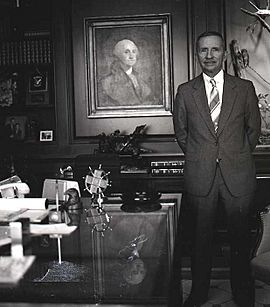
After visiting Laos in 1969, Perot became very involved in the issue of American soldiers missing or captured during the Vietnam War. He believed that hundreds of American servicemen were left behind in Southeast Asia. He also thought government officials were hiding information about these investigations. Perot even had his own talks with Vietnamese officials in the late 1980s. This caused problems between Perot and the U.S. government.
In 1990, Perot was against the United States getting involved in the Persian Gulf War. He tried to convince senators to vote against the war. Around this time, he started thinking about running for president.
1992 Presidential Campaign
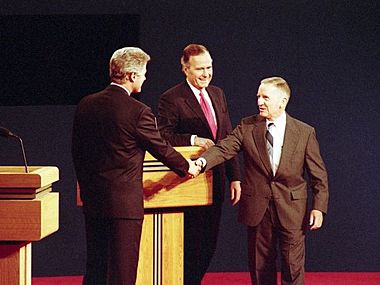
On February 20, 1992, Perot appeared on CNN's Larry King Live. He announced he would run for president as an independent if his supporters could get his name on the ballot in all 50 states. He talked about balancing the government's budget. He also wanted to stop jobs from moving to other countries. He suggested using "electronic town halls" for people to vote directly on issues. He quickly became a strong candidate, polling almost as well as the two main party candidates.
Many people were interested in Perot's campaign. His supporters started collecting signatures to get him on the ballot in all states. Perot hired experienced campaign managers, Hamilton Jordan and Ed Rollins. Perot was slow to share his detailed plans. However, most of his ideas aimed to reduce the national debt, like raising the fuel tax. In June, a Gallup poll showed Perot leading with 39% of the vote.
In July, Perot's campaign faced problems, and his poll numbers dropped. News reports said his campaign managers were frustrated because Perot didn't follow their advice. He wanted to control everything. On July 15, Ed Rollins resigned. Perot's support fell to 20%. The next day, Perot announced on Larry King Live that he would not run for president. He said he didn't want the election to be decided by the House of Representatives. Later, Perot said he withdrew because he received threats that fake photos would be used to ruin his daughter's wedding. His reputation was hurt, and many supporters felt let down.
In September, he qualified for all 50 state ballots. On October 1, he announced he was re-entering the race. He spent about $12.3 million of his own money. Perot used a new way to advertise: he bought half-hour blocks of time on TV networks for long campaign ads. These ads got more viewers than many TV shows.
Before the debates, Perot had about 7–9% support in polls. The debates helped him a lot. Experts said Perot "convincingly won the first debate." In the debate, he said:
Keep in mind our Constitution predates the Industrial Revolution. Our founders did not know about electricity, the train, telephones, radio, television, automobiles, airplanes, rockets, nuclear weapons, satellites, or space exploration. There's a lot they didn't know about. It would be interesting to see what kind of document they'd draft today. Just keeping it frozen in time won't hack it.
In the 1992 election, Perot received 18.9% of the popular vote, which was about 19.7 million votes. He didn't win any electoral college votes. This made him the most successful non-major-party presidential candidate in terms of popular vote percentage since Theodore Roosevelt in 1912. Perot finished second in two states: Maine and Utah. His total popular vote is still the highest ever for a candidate not from a major party.
Studies showed that Perot's supporters came from all political groups. Most of his voters were middle class. Experts believe his presence in the race likely did not change who won the election. After the election, Perot continued to speak out against the North American Free Trade Agreement (NAFTA). He famously said that if NAFTA passed, there would be a "giant sucking sound" of American jobs moving to Mexico.
1996 Presidential Campaign
Perot tried to keep his political movement active in the mid-1990s. He continued to talk about the growing national debt. He was a strong opponent of NAFTA. On November 10, 1993, Perot debated then-Vice President Al Gore about NAFTA on Larry King Live. About 16 million people watched. Many people felt this debate hurt Perot's political career.
In 1995, he started the Reform Party. He won their nomination for the 1996 United States presidential election. His running mate was Pat Choate. Perot received 8% of the popular vote in 1996. This was lower than in 1992, but still a very good result for a third-party candidate. He spent less of his own money this time and allowed others to donate to his campaign. One reason for the lower vote was that he was not allowed to participate in the presidential debates.
Later Activities
In the 2000 presidential election, Perot did not get involved in the Reform Party's disagreements. He was reportedly unhappy with how the party was falling apart. Four days before the election, he appeared on Larry King Live and supported George W. Bush for president.
In 2005, Perot spoke to the Texas Legislature. He supported ideas to give students more access to technology, like laptops. He also wanted to change how textbooks were bought, suggesting e-books and allowing schools to buy books locally. In an interview that year, Perot said he was worried that the issues he talked about in his campaigns had not been solved.
In January 2008, Perot supported Mitt Romney for president. He also said he would launch a new website with economic charts. In June 2008, his blog started. It focused on government programs like Medicare, Medicaid, and Social security, and the U.S. national debt. In 2012, Perot again supported Romney for president. He did not endorse anyone in the 2016 election.
Political Views
Perot's political views were unique. People saw them as either practical or focused on what the average person wanted. His main focus was usually on economic policy, like balancing the budget. This helped him get support from both Democratic and Republican voters.
Perot supported stricter gun control, like banning certain types of weapons. He also supported more research into AIDS. During his 1992 campaign, Perot was careful about discussing gay rights. However, in 1996, he openly supported them.
Economic Policy
Perot believed that taxes should be increased for wealthy people. He also thought government spending should be cut to help pay off the national debt. Perot wanted to increase the tax on profits from investments. At the same time, he wanted to give tax breaks to people starting new businesses.
In his 1993 book Not For Sale at Any Price, Perot supported giving tax cuts to small and medium-sized businesses, not just large corporations. Regarding trade, Perot said that NAFTA caused a trade imbalance between Mexico and the United States. He also believed it led to a loss of manufacturing jobs in the U.S. His stance on free trade and NAFTA became a key part of both his 1992 and 1996 presidential campaigns.
Personal Life and Death
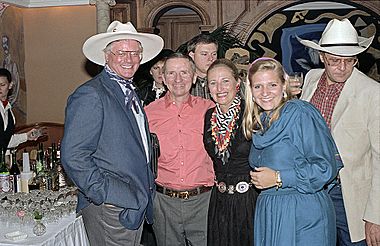
Perot and his wife Margot (born November 15, 1933) had five children: Ross Jr., Nancy, Suzanne, Carolyn, and Katherine. They also had 19 grandchildren.
Ross Perot died from leukemia in Dallas, Texas, on July 9, 2019. He passed away less than two weeks after his 89th birthday. At the time of his death, he was worth about $4.1 billion. Forbes magazine ranked him as the 167th richest person in the United States. He was buried at the Sparkman-Hillcrest Memorial Park Cemetery. A memorial service was held at Highland Park United Methodist Church.
Honors and Achievements
- In 1970, he received the Golden Plate Award from the American Academy of Achievement.
- In 1985, he was added to the Hall of Great Westerners at the National Cowboy & Western Heritage Museum.
- In 1986, Perot was the third American to receive the Winston Churchill Award. This was for his work helping American prisoners of war in Vietnam and for organizing the rescue of two EDS employees from prison in Iran.
- In 1980, he received the Oak Cliff Lions Clubs' "Humanitarian Award."
- In 1986, Perot received the S. Roger Horchow Award for Greatest Public Service by a Private Citizen. This award is given yearly by the Jefferson Awards.
- Perot was inducted into the Junior Achievement U.S. Business Hall of Fame in 1988.
- On April 22, 2009, Ross Perot was made an honorary Green Beret. This happened at the John F. Kennedy Special Warfare Center and School in Fort Bragg, North Carolina.
- In May 2009, he was named an honorary chairman of the OSS Society.
- On September 18, 2009, the Texarkana Independent School District named him a 2009 Distinguished Alumnus. He graduated from Texas High School in 1947.
- On October 15, 2009, the United States Military Academy at West Point gave him the distinguished Sylvanus Thayer Award.
- On April 20, 2010, Perot received the Distinguished Leadership Award from the Command and General Staff College Foundation, Inc.
- To honor Perot's 80th birthday, the bridge connecting Walton and University drives in Texarkana, Texas, was named the H. Ross Perot Bridge.
- On October 2, 2010, Perot received the William J. Donovan Award from the OSS Society. He was the 26th person to get this award.
- In September 2011, Perot accepted the Army Heritage Center Foundation's Boots on the Ground Award.
- On October 28, 2011, the Perot Museum of Nature and Science announced they were naming a new species of the dinosaur genus Pachyrhinosaurus after the Perot family. The new species is called Pachyrhinosaurus perotorum.
See also
 In Spanish: Ross Perot para niños
In Spanish: Ross Perot para niños
 | Emma Amos |
 | Edward Mitchell Bannister |
 | Larry D. Alexander |
 | Ernie Barnes |


